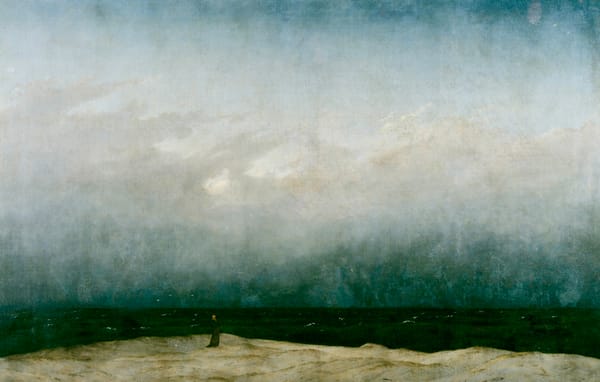Rumi and the Ocean of Nonexistence
Rumi's most cardinal doctrine is the invitation of his disciples to a nonexistence which, not only is above any form of being, but constitutes our final end and teleology.

A return from existence to nonbeing when effected positively by way of integration is from the intellectual or spiritual point of view the summum bonum. ~Ananda Coomaraswamy
The accidental is something closely akin to non-existent. ~Aristotle, Metaphysics
In Rumi’s view God is equated with Love; another place he says, "What is Love? The Ocean of nonexistence (darya-i adam)." Thus we may deduce the following formulation:
God = Love = Nonexistence
I do not intend to say that these three are fundamentally synonymous, but that each expresses an attribute of the same reality. For instance, God in His aspect of the "hidden treasure" who wants to make Himself known through emanation, is Love; and in His formless, modeless and undifferentiated state which escapes all definition and limitation and Who is infinitely remote from all human understanding, is a pure nothingness.
It is for this reason that, for example, Meister Eckhart makes use of such expressions as the "nothingness of the godhead" or when he says that we cannot attribute "being" to God, because He is a "transcendent being, and a superessential nothingness."1 For the essence of God is a divine darkness - it is dark, namely, because of the excess of light.2
Similarly, Saint Thomas Aquinas, the great medieval master, has said with regards to the famous theological doctrine of creatio ex nihilo (Ar. al-khalq min al-adam) that it matters not if we say that the world was created ex nihilo (out of nothing) or ex Deo (out of God), taking the two terms to be essentially identical: "Creation, which is the emanation of all being, is from nonbeing, which is nothing" (Creatio, quae est emanation totius esse, est ex nonente, quod est nihil).3 Or in the words of Böheme, “God is properly to be spoken of as No Thing.” And Dante who with regard to the things that our intellect cannot behold, said that we cannot understand them except by denying things of them (Convivio, III. 15).
Now if we equate God with pure being, then the following words by Hegel will also fall into the same domain as the above sayings: "being, the indeterminate immediate, is in fact nothing (Nichts), and neither more nor less than nothing." The reason being that any definition by necessity limits that which is defined, and God who is both Infinite and All-possibility, cannot be limited.4 Thus nothing true can be said of God. Consider the following passage by Professor Chittick.
God is not only all; He is also "nothing." In other words, viewed in respect
of incomparability, the Real is no thing as opposed to any other thing, since the Real transcends all things and all attributes. God possesses all qualities, so He cannot be defined by any of them to the exclusion of any other. Hence He has no specific reality other than to be Reality as such, without any delimitation. Reality as such is not a thing as opposed to other things, but the source of all things. Hence the Real is no thing, nothing.5
Now before I embark upon an elucidation of Rumi's view of nothingness, I should like to say a few words about the nature of nihil itself. Now nihil or "nothing" can be viewed from multiple angles, all being true in a measure. The proper meaning of this word, however, is that which is known to the common-people, namely a "nothing" which is inferior to being and which is the cause of evil and darkness. In this connection, "nothingness" corresponds with matter, for matter is nothing but the "reduction" of nothingness to the utmost density and lowest cosmic level.
The second meaning of nihil is the esoteric understanding of it. In this sense nihil is not a mere privation, but stands so to speak "above" existence. For if the world is "real" and is a "thing," then this means that God who is not the world, from the viewpoint of Manifestation, is a no thing, hence nothing.
Now in Rumi we are confronted with a range of verses dealing with the relation of "non-existence" (adam) to "being" (wujud). But before we proceed we must note that in Rumi's phraseology "non-existence" has many shades of meaning: it implies at once natural death, spiritual death, true being, extinction in God (fana-i fi allah), the Unmanifest, the Unseen (al-qayb), ground, the world of meaning, the perceptible world which is devoid of true reality, and the realm of Unity. Therefore when reading him we must beware of whether he is using the positive or negative connotations of this term.
Observe that Rumi designates "non-existence" to both the inward realm of meaning, and at the same time to the physical realm, using this word according to different contexts. Here we are confronted with a double meaning of the term "non-existence": first, it is designated to that undetermined, undifferentiated and boundless and infinite "field" or "ground" (Eckhart’s Grund), from which all determination rise; secondly, "nonexistence" is applied to the sensorial realm of matter wherein we currently dwell, and to the existent things of this world, and this implies the main understanding of the term which evokes a sense of nullity and lack and deficiency in things; it is, in other words, a sort of extinction and annihilation, e.g. our physical body becomes "non-existent" after death.
Thus existence can be thought of as an "actuality of non-existence"; Being, from this point of view, will be envisaged as a determination (ta’ayyun) of the Unmanifest.
Behold the inscriptions made without the use of fingers upon non-existence, and the amazement of the madmen at the blackness of them. (V, 318)
The essence or reality of existence is therefore nonexistence, and the things of this world to which we assign absolute reality are, from this viewpoint, nonexistent shadows in the cloak of existent entities. Here Rumi as usual is adhering to that pure metaphysic which asserts that the highest good is not, as some people assume, Being (Ishvara), but the Unmanifest, the Supreme Principle or the Essence (Brahman).
I shall now enumerate the various notions of Rumi’s conception of nothingness as follows:
1) Nonexistence as pure essence, wherein being and nonbeing are identical.
هستِ مطلق، کارساز نیستی ست
کارگاهِ هست کُن جز نیست چیست؟
The Absolute Being is a worker in non-existence,
what but non-existence is the workshop of the Maker of existence?
(V, 1960, N)
Know that in Non-existence there are Suns,
and what is sun here is but a small star in the
spiritual realm.
Non-existence, then, is God’s factory,
from which he continually brings out gifts.
(V, 1017-25)
Rumi’s inclination toward such concepts as "nothingness", "non-existence" and "naught" is evident; we may infer from his poems – and also from his state of being – that he is continually seeking an "es-cape" from existence to an uncreated pure Essence, from being to nonbeing, wherein the created and the Creator are dwelling in an eternal union. Now to come into existence is to become "separated" from our Origin, it is to be exiled from the realm of Unity into the multiplicity of the world; or in metaphysical symbolism, it is to be transposed from the center of the circle to its outermost periphery. Etymologically and semantically, however, existence conveys the notion of separation and removal, as Schuon has remarked so admirably,
Existence by its very nature is an “exit” (ex-sistere, ex-stare) out of Unity
and thus in the plane of separation, whereas intelligence, being unity by its
intrinsic nature, is the ray leading back to the Principle.6
It is Rumi’s goal, moreover, to break through all that is limited and finite, from all contingencies and definitions, into that "reed-bed" (neyestan) from which he has become momentarily separated.
بشنو از نی چون حکایت می کند
وز جدایی ها شکایت می کند
از نیستان تا مرا ببریده اند
در نفیرم مرد و زن نالیده اند
Listen to the reed how it tells a tale,
complaining of separation.
That since I was parted from the reed-bed,
my lament has caused man and woman to moan.
Thus, it would not be without reason to say that Rumi believed in the "principiality of non-existence" (isalat-i adam).
How blessed is this place of nonexistence!
For the aids of being is from the Nonexistent.
Another reason that explains Rumi's fondness of non-existence, however, is that in Rumi's view the true Lovers (of God) are opposed to their selfish and egoistic existence, and it is precisely by means of this opposition that they become wholly integrated and attain full being. He explicitly tells us that he is in love with non -existence: "I am drunken with the desire for non-existence, not for the existent, because the Beloved of nonbeing is more faithful"; "he who is an enemy of existence possesses real existence" (II, 1470); "I have found true individuality in non-individuality" (I, 1735); and again, "Lovers have set their tents in non existence, they are, similar to non-existence, of one essence and quality" (III, 3024); "Lovers have nothing to do with existence" (III, 3021).
Since you have heard the description
of the sea of non-existence,
Continually seek to stand upon this sea.
For the origin of God’s workshop is that non-existence,
it is void, traceless and empty.
All the masters seek non-existence,
necessarily God who is the Master of masters
His workshop is non-existence and naught.
Wherever this non-existence is greater,
in there is God’s work and workshop more manifest.
Since non-existence is the highest station,
the dervishes have outstripped all.
(VI, 1466-71)
Again in the Divan Rumi says:
Hail to that non-existence who swept away our being,
from the love of that non-existence came to birth
the world of the Spirit.
Wherever non-existence goes,
being reduces.
Hail to non-existence,
that when it came it increased existence.
being is like a straw in face of the wind of non-existence,
where is that mountain which non-existence did not
destroy like the straw?
But we should keep in mind that this integration in the "sea of non-existence" or extinction in God is not, as many assume, a loss of one's identity or a becoming no-one; but rather the spiritual Wayfarer, after reaching the Highest Good and the summit of existence and hence attaining the Supreme Identity, becomes one with God. But during this oneness and Union, the individual nevertheless retains that which makes him what he is, namely his essence. For a better understanding of this idea we may employ the following analogy: when a drop of water returns to the sea, in a reciprocal manner, the drop is the sea and sea is the drop. Similarly, when our voyage to the Supernal Sea is reached, we will lose our accidental identity in favor of our higher Self, and our essence will become fixed in God; our state of being, in Eckhartian terminology, will be a "fusion without confusion" or "distinction without difference." In the words of the same Master:
The soul, in hot pursuit of God, becomes absorbed in Him, and she herself
is reduced to naught, just as the sun will swallow up and put out the
dawn.
I return now to Rumi’s conception of nonexistence. The Master of Rum
conceives of anything other than the pure Essence of God to be illusory and of a
relative reality, and this of course he derives from the Quranic dictum, “Everything will perish, save His Face” (28:88). Mulla Sadra, on the other hand, takes this doctrine even a step further and declares all that is beneath the level of the Absolute – that is, Manifestation as a whole including the celestial spheres and intellectual substances – as ephemeral, he says:
Know that everything other than God is empty and transient; even the
Intellects and causes, and all other than His sovereign Presence is subject
to destruction and decay; and so are the Angels and the Spirits, not to
mention the celestial spheres and stars...thus anything in motion testifies
to its own dissolution and death.7
Since the workshop of God is non-existence,
thus what is outside this workshop is worthlessness. (II, 690)
Similarly, Attar says:
Put aside existence and to Nothingness go
For in Nothingness lies our true abode
Know with certainty, that from Nothingness arose,
All wherein existence is found.
And again, Rumi:
Come forth and become non-existent,
for non-existence is the mine of the Spirit. (Divan)
In Islam there are certain scholastic theologians (mutikallimun) who assume that contingencies, before coming into existence, have a certain subsistence in the realm of nonexistence. The Mu'tazilites, too, are of the belief that between existence and non-existence there is a mediator, which they entitle "hal" or "state". They define it thus: that which is in hal, is neither existent nor non-existent, and that contingencies are threefold: (1) the existent contingent, (2) the non-existent contingent, (3) and "hal" which is neither existent nor non-existent; but is something between the two.
There are certain verses in Rumi's Mathnawi which in a sense affirm the above doctrine, for example the phrase "existent-appearing non-existent" (nist-i hast nama), and "non-existent appearing existent" (hast-i nist nama); or, when he says, "it was existent and non-existent in the manner of fantasy", he is precisely referring to that intermediate and dreamlike state in which things "are" and "are not", simultaneously.
The notion of non-existence is also stated in these famous lines of Rumi:
I died from mineral and became a plant,
Then I died to vegetable and became an animal.
From the animal state I died and became human.
Why, then, should I fear death?
When have I become less by dying?
Another attack I shall die from the human condition,
So that I may pass into the realm of angels.
From the state of angels too I must escape,
Everything perishes except His Face.
Once again I shall die to the angelic state,
And become that which cannot be conceived by any imagination.
Then I shall become non-existent,
non-existence said to me as an organ,
verily, “Unto Him we shall return.”
(III, 3901 – 06)
In the above poem the vertical evolution of man is taken for granted. And observe that the final and highest stage of this ascending progress, of this progressio harmonica, is non-existence. It is in this stage that the Wayfarer becomes wholly extinct in the Divine Prototype; an extinction after which subsistence (baqa) follows.
2) Nonexistence as absence and negation of being.
There is a caravan on caravan, O Lord,
moving continually from non-existences to existence. (I, 1889)
Here Rumi is speaking of the coming to existence of creatures, from a state of nonbeing into being. Note that in the above verse Rumi is not referring to pure nothingness, but is using it in the negative sense, that is, as a sort of lack and deficiency in need of being; otherwise he would not have used “non-existence”
in its plural form (adamha).
When He recites spells over the non-existences
which have no eye or ear, they begin to stir.
Because of His spells the non-existences at that
very moment are dancing joyously into existence.
When, again, He recited a spell over the existent,
at His word the existent marched (back) post haste into
non-existence. (I, 1448-50 RN).
Many of the commentators of the Mathnawi such as Akbar abadi and Lahoori, assume that “reciting spell” here refers to the "existentiating" function of the commad Be (kun) of the Quran. Here Rumi’s view is similar to that of Ibn Arabi, who says that prior to coming into existence, creatures are in the knowledge of God in the forms of fixed archetypes (a’yani- sabet), and thence descend from the realm of intelligibility into manifestation. However, Rumi ascribes the attribute of non-existence to creatures for the reason that they are “existent-appearing non-existents”; for example when he says,
پیش بی حد هرچه محدود ست الست
کل شی غیر وجه اهلل فناست
In the face of the Infinite,
all that is limited is naught.
Everything except the face of
God, is extinct. (II, 3321)
O you annihilated rotten people,
from the Hymn of the Friend, return from non-existence. (I, 1935)
That nonexistence which is more dead than the dead,
at the moment of its creation it is in distress. (I, 3070)
Or in the words of Meister Eckhart,
In God there is light and being, and in creatures there is darkness and
nothingness, since what in God is light and being, in creatures is darkness and nothingness.
Let us now say a few words about the nature of this “nothingness” as lack and nullity. It is important to know that this “nothingness” does not have an existence in itself, it is not so to speak a “realm” a “thing” or a level of being; in other words, it is nothing but the absence of being, as darkness is nothing but the absence of light. Observe the following sayings by Schuon:
"Nothingness certainly has neither being or existence, but it is nonetheless a
kind of metaphysical “direction”, something we can conceive and pursue, but never attain."
"Nothingness cannot exist, but the direction towards nothingness exists, and indeed this observation is fundamental in metaphysics."
3) Manifestation as nonexistence.
The fundamental doctrine of Islam underlying its metaphysic is expressed in the formula of the Shahadah: “There is no divinity save the sole Divinity” (la ilaha illa allah). This formula is comprised of two poles, a negation (la ilaha) and an affirmation (illa allah). The first part which negates, in metaphysical formulation, is applied to all that is not God; and can be corresponded to the Upanishadic dictum “neti neti” (not this, not that). The Supreme Essence or Brahman is neither this nor that, but It is wholly Itself, an Unknown Unknowable dwelling in an integral unity. This negation, moreover, when applied properly forms the basis of Theosophy (hikmat-i ilahi), for by means of it the illusory is distinguished from the Real: The world is not God and therefore not eternal, and it will thus perish in its appointed time when it reaches the end of its cycle.
The true metaphysicians therefore see the world, which is an “existent nothingness”, as transparent, that is to say, they pass through the phenomena and its myriad accidents and penetrate into its substance (jawhar). The world for them is not an absolute entity, nor an absolute nothingness, but something in between. It is for this reason that many people have likened the cosmos to the Interworld (barzakh).
God has made the non-existent to appear existent and magnificent,
And has caused the existent to appear in the form of non-existent.
We deemed negation to be affirmation,
We had a non-existent-seeing eye.
The eye that appeared in a state of slumber,
How should it be able to see anything but fantasy and non-existent?
Necessarily we were bewildered by error,
Since Reality was hidden and fantasy visible.
Wondering why He (God) set up this non-existent in our view,
And why He caused that Reality to be hidden from sight. (V, 1026-35)
The World, according to Hindu doctrine, was measured out by God. And this of course is present in the word Maya (from the root "ma." Which means "to measure"). Thus the World is an artefact of the Demiurge or the divine Artisan, who has created the universe according to a perfect model. The Spirit, at the "moment" of Creation, gave form to nothingness, or in other terms, projected itself in the direction of the Void, and this reverberation gave birth to indefinite worlds and realms.
We may conclude therefore that "non-existence" occupies a central role in Rumi’s Weltanschauung, and that his greatest aspiration and his most cardinal doctrine is the invitation of his disciples to a non-existence which, not only is above any form of being, but constitutes our final end and teleology.
1 Eckhart further says: "So be silent and do not chatter about God, because by chattering about Him you are lying and so committing a sin. So, if you want to be without sin and perfect, don’t chatter about God...Nor should you seek to understand anything about God, for God is above all understanding." And also Hermes, "Then only will you see it, when you cannot speak of it; for the knowledge of it is deep silence, and suppression of the senses."
2 The darkness of the Essence of God has been stated by many metaphysicians of the middle ages; we see the same notion, for example, in the thought of Ayn al-Quzat Hamadani in the East, and also in Meister Eckhart.
3 Rumi himself makes a direct reference to the world being created by God ex nihilo: "Since He was making the heavens from non-existence and spreading this carpet of earth" (VI, 3135). For the correct understanding of the meaning of Creatio ex nihilo see Frithjof Schuon, Survey of Metaphysics and Esoterism, p. 49
4 "God Himself does not know what He is, because He is not any 'what'".
5 William C. Chittick, Imagnial Worlds: Ibn al-Arabi and the Problem of Religious Diversity. P.169.
6 F.Schuon, Language of the Self, p.140.
7 Mulla Sadra, Temporal Genesis of the World.





